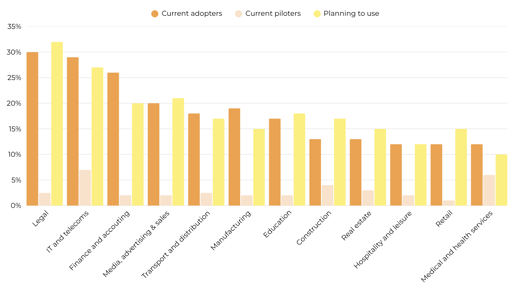What's on this page?
Jump to:
- Why is Learning AI so Critical in 2025?
- How Learning AI with Purpose will Benefit your Career
- What Areas of AI Do You Need to Learn for Different Roles and Sectors?
- How to Start Learning AI Today (Step-by-Step Advice)
- Final Thoughts: Don’t Aim to Master All AI — Aim to Master Your Career
- FAQs about Learning AI
Why is Learning AI so Critical in 2025?
Right now, the UK job market is going through one of the fastest shifts we’ve seen in years, and AI is at the centre of it.
With eBay recently launching their £3 million AI skills programme, and latest reports citing the UK's rising 'invisible AI workforce', it's clear that learning to use AI is no longer optional.
In the past 18 months, AI has gone from the fifth most in-demand tech skill to number one, according to Nash Squared’s 2025 Digital Leadership Report. Over half of UK Tech leaders now say they can’t hire enough people with AI skills – more than double last year’s figure.
And this isn’t just a Tech sector story: one of IT Pro's latest reports highlights that over two-thirds of people using AI in the workplace, are in roles outside of Tech. Being able to use AI tools is quickly becoming as standard as knowing how to use email or Excel. It's evident that this transforming is transcending sectors.
Our Director of Education puts it simply:
"AI skills are no longer a nice-to-have for almost all sectors, especially in tech: they’re critical must-haves."
Research from McKinsey shows the change is already visible. Job adverts have dropped most in roles where AI has the potential to take over or streamline tasks – like Software Development, Data Analysis, and certain legal services. This doesn’t mean those careers are disappearing. It means they’re evolving, and the people who know how to work with AI will have a clear edge.
---
The takeaway? You don’t need to become an AI specialist, but you do need to understand how AI is used in your field and start building the skills to use it yourself. The earlier you do this, the more secure your career will be as the technology continues to grow.
Fact: 81% said they believe agentic AI will help them do their job more effectively
Salesforce's latest AI survey revealed that the majority of workers believe that Agentic AI (a type of AI that is focused on autonomous decision-making and action) will support them positively in their job roles.
Read our new blog on how Project Managers are leading the way with AI integration in the UK.

How Learning AI with Purpose will Benefit your Career
If the idea of learning AI feels overwhelming, you’re not alone. AI is a huge, constantly evolving field, and most beginner guides make it sound even more intimidating. They often start by telling you to master advanced maths, statistics, and programming before you even touch an AI topic.
For most people, that’s a fast track to giving up before you’ve even begun. The time, cost, and energy required to follow that route makes sense if your goal is to become a full-time AI engineer or researcher. But that’s not what the majority of career changers, or even tech professionals, are aiming for.
The truth is, you don’t need to build AI models from scratch to benefit from AI in your career. You don’t need to understand every algorithm in detail to make use of the tools. What you do need is the ability to use AI confidently and effectively in the context of your role or industry.
Think about it like driving a car: you don’t have to design the engine or build the gearbox to be a safe, skilled driver. You just need to know how to operate it. And, over time, how to get the best performance from it. AI is no different.
This is why we always recommend starting with a career focus. By understanding where AI fits in your sector, you can target your learning to the tools, platforms, and use cases that will actually make you more employable – instead of trying to learn all of AI and getting lost in the process.
Fact: UK businesses' investment in AI is soaring
The 2025 Q2 Barclays Business Prosperity Index revealed over the past year, businesses have already invested around £235,600 on AI and emerging technologies, with 68% planning to increase over the next year.
Discover how employers across the Tech sector are prioritising professionals with AI skills in our latest blog.

What Areas of AI Do You Need to Learn for Different Roles and Sectors?
One of the quickest ways to waste time (and money) learning AI is to dive into every possible topic without a clear destination in mind. AI is vast, so the smart approach is to focus on how it’s being used in your target field, and build skills around those applications.
Here are some examples.
AI is being used for real-time threat detection, analysing huge volumes of data to flag suspicious activity faster than humans can.
AI-powered tools are automating routine admin, forecasting timelines, and identifying risks before they become problems.
Machine learning models are at the heart of extracting insights from complex datasets – a core skill for Data Analysts and Scientists.
AI can help write, review, and test code more efficiently, freeing up developers to focus on problem-solving and creative design.
AI supports dynamic resource allocation and predictive scaling in cloud environments, improving performance and cost-efficiency.
Before you commit to learning AI, be clear on where you want your career to go...
"Without a focus, it’s easy to disappear down the AI rabbit hole and come out the other side with a lot of knowledge you’ll never use.
At Learning People, we take this targeted approach in all our learning pathways. Whether you choose data analytics, software engineering, project management, or cyber security, your training includes the AI tools and methods most relevant to that sector. That way, you’re not just learning AI; you’re learning the right AI skills to thrive in your chosen career."
How to Start Learning AI Today (Step-by-Step Advice)
Getting started with AI doesn’t have to mean months of research before you take your first step. The key is to keep it practical, focused, and tied to your career goals. Here’s a five-step approach we recommend to our students.
1. Define your career goal
Before you open a single AI tutorial, decide where you want to go. Do you see yourself in Cyber Security, Project Management, Data Analysis, Software Engineering, or another IT field? Your destination will shape the AI skills you need.
2. Research how AI is impacting that industry
Look for real examples of AI in your chosen sector: think industry blogs, company case studies, and job ads. They can all give you clues. If most employers are asking for experience with a specific tool or workflow, that’s a clear sign of where to focus.
3. Choose the skills, knowledge, and certifications that align with that need
Once you know what’s in demand, identify the specific skills to learn. This could be anything from prompt engineering for generative AI, to using machine learning models for predictive analysis, to working with AI-powered security tools. Certifications can help prove your abilities to employers.
4. Pick a structured learning path (not just random YouTube videos)
Free online content can be great for quick tips, but it’s no substitute for a structured pathway that builds your skills in the right order and alongside other essential qualifications. That’s why our Career Pathways include AI modules within broader certifications, giving you both depth and career-ready breadth.
5. Get career support as you learn
Learning AI is only half the journey. Landing a role where you can use it is the other half. Seek out training providers that offer career coaching, CV guidance, and interview prep. At Learning People, our wraparound career support helps you turn your new skills into a real job opportunity.

Final Thoughts: Don’t Aim to Master All AI — Aim to Master Your Career
You don’t need to become an AI expert to benefit from it. What matters is learning the skills that will help you work smarter, stay relevant, and stand out in your chosen field. AI is a tool, and like any tool, it’s most powerful when you know exactly how to use it for the job at hand.
Some words of advice from our Director of Education:
“You don’t need to be an AI expert, but you do need to understand it. Talk to our Career Consultants today to find the right pathway for you and start building skills that employers are actively looking for.”
Don’t get stuck trying to learn everything at once. Start with clarity on your career goal, then take action to build the AI skills that will genuinely make a difference.
If you’re not sure where to begin, that’s what we’re here for. Our Career Consultants can help you design a flexible, affordable Career Pathway in sectors like Data Analytics, Software Engineering, Cyber Security, and more – all with the AI training you’ll need.
FAQs about Learning AI
Related Articles
 Career Advice
Career AdviceWhat Are Soft Skills and Why Are They so Important for Tech Professionals?
[Last updated 15/10/2025] Discover what soft skills are and why they’re vital for success in tech industries. Learn how communication, adaptability and emotional intelligence can future-proof (and AI-proof) your career when developed alongside technical skills.
Read More AI
AIThe Uses and Impact of AI in Project Management
Did you know that Project Management is one of the leading sectors in AI transformation and adoption across the globe? Whether you're looking to start or progress your Project Management career, make sure you understand how AI is being used in project-based roles and how this is impacting the industry.
Read More Changing Career
Changing CareerHow to Change Careers: The Ultimate Guide to Switching to a Career You Love
[Last updated 08/10/2025] Feeling unfulfilled in your current job? Discover how to define your career change goal, assess your skills, explore new industries, and plan your career change with the right support.
Read More Tech
TechSoft Skills More Necessary Than Ever According to New Report
In a world where AI and machine learning is a top desired skill for businesses globally, are we neglecting the human element?
Read More

